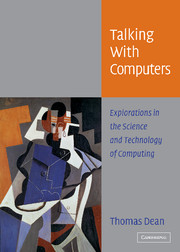Book contents
- Frontmatter
- Contents
- Preface
- Acknowledgments
- 1 TALKING WITH COMPUTERS
- 2 THE SHELL GAME
- 3 KEEPING TRACK OF YOUR STUFF
- 4 DON'T SWEAT THE SYNTAX
- 5 COMPUTATIONAL MUDDLES
- 6 GETTING ORIENTED
- 7 THANKS FOR SHARING
- 8 YOU'VE GOT (JUNK) EMAIL
- 9 MODERN ARCHITECTURE
- 10 DO ROBOTS SLEEP?
- 11 UNDER THE HOOD
- 12 ANALYZE THIS
- 13 FOREST FOR THE TREES
- 14 SEARCHING THE WILD WEB
- 15 DARWIN'S DANGEROUS ALGORITHM
- 16 AIN'T NOBODY HERE BUT US MACHINES
- Bibliography
- Index
12 - ANALYZE THIS
Published online by Cambridge University Press: 05 June 2012
- Frontmatter
- Contents
- Preface
- Acknowledgments
- 1 TALKING WITH COMPUTERS
- 2 THE SHELL GAME
- 3 KEEPING TRACK OF YOUR STUFF
- 4 DON'T SWEAT THE SYNTAX
- 5 COMPUTATIONAL MUDDLES
- 6 GETTING ORIENTED
- 7 THANKS FOR SHARING
- 8 YOU'VE GOT (JUNK) EMAIL
- 9 MODERN ARCHITECTURE
- 10 DO ROBOTS SLEEP?
- 11 UNDER THE HOOD
- 12 ANALYZE THIS
- 13 FOREST FOR THE TREES
- 14 SEARCHING THE WILD WEB
- 15 DARWIN'S DANGEROUS ALGORITHM
- 16 AIN'T NOBODY HERE BUT US MACHINES
- Bibliography
- Index
Summary
Most physicists believe that the speed of light is a fundamental limit on how quickly we can move through space. This claim is based on the predictions of mathematical theories and the results of experiments that appear to support them. According to theory, it doesn't matter whether you move through space with a pogo stick or an anti-matter drive, you're still subject to the rules governing all matter in the universe and thus unable to exceed the speed of light.
What if there are limits on what you can compute? Pharmaceutical companies simulate interactions at the atomic level in searching for molecules to cure diseases. There could be viruses for which it will take years to find a vaccine – there is simply no way to speed up the necessary computations. Software developers who write the programs that keep airplanes flying and emergency rooms functioning would like to prove that their code won't malfunction and put lives at risk. But maybe it's impossible to provide such assurances.
In some cases, computational limitations can work to our advantage. Some programs exploit the difficulty of computing answers to particular problems; for example, the most popular encryption schemes for transferring information securely on the World Wide Web rely on the difficulty of computing the prime factors of large composite integers. Of course, if someone figures out how to factor large numbers efficiently, our privacy will be seriously threatened.
- Type
- Chapter
- Information
- Talking with ComputersExplorations in the Science and Technology of Computing, pp. 196 - 212Publisher: Cambridge University PressPrint publication year: 2004



